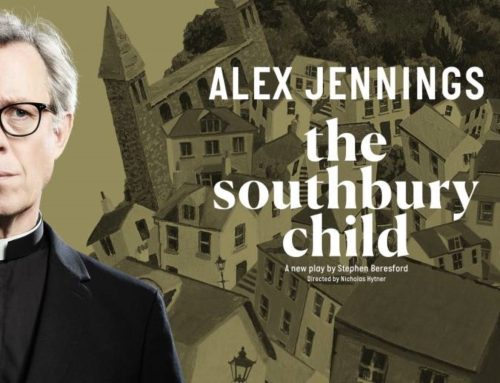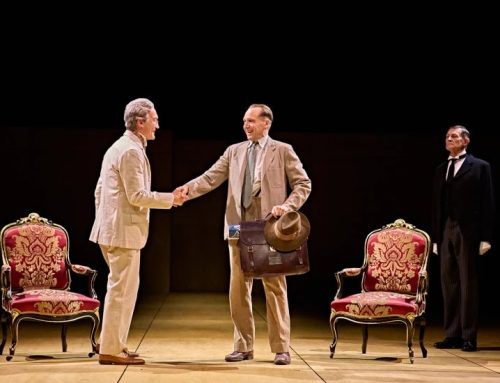Mid-way through John Gabriel Borkman, Ibsen’s infrequently performed penultimate play, the eponymous protagonist comments (at least in Adapter Lucinda Coxon’s solid adaptation currently running at The Bridge Theatre) that “When push comes to shove, all women are more or less interchangeable.” As a summary of who a character is, lines do not get much better than that.
There is no artifice with convicted fraudster Borkman, here played with thrilling tragic energy by Simon Russell Beale. This is a man who craves the possibilities afforded by power, ambition, and financial success more than any potential or actual human bond. You may not like the man, or the fact he cheated hundreds of friends and investors out of their live savings, but what you see is what you get. His is a clear, honest, and direct confession that his relationships with women (indeed all his human relationships) are transactional in nature: subordinate to the demands of seeking (and in his case dramatically losing) material success. Borkman is a man imprisoned by his own terrible nature and he is not afraid to own it.
Borkman spends 5 years in prison for the crimes he committed, then a further 8 living alone – just as trapped – on the floor above estranged wife Gunhild (Clare Higgins). The two never communicate. All Gunhild hears of her former partner is the frantic thud, thud, thud of his pacing around upstairs, never at rest, and never allowing himself to rest. His bitterness about the supposed treachery that brought him down is matched only by Gunhild’s determination to see the cloud lifted from the family name.
Enter Ella (Lia Williama), the sickly estranged sister of Gunhild and former lover of John. Independently wealthy, she owns the house in which the pair live and spent many happy years during John’s imprisonment looking after the couple’s son, Erhart. She has a proposal for Gunhild, one which reopens old wounds and sets the scene for dramatic revelations.
Anna Fleischle’s set is gorgeous: a contemporary Scandinavian home with bare concrete walls. Lit in silvery blue and with huge picture windows looking over snow-dusted forests, it effortlessly evokes the feel of a luxury prison. Inside, Gunhild sits on a battered blue sofa with only a TV and a couple of one-bar electric fires for company. It is a bleak location for bleak events.
John Gabriel Borkman is a story which sometimes feels like an extended epilogue to another, longer, earlier narrative. Nicholas Hytner’s direction is pacey and effective, emphasising that what is happening is really the closing of accounts between the main characters.
Unfortunately, the production is fatally slowed down by some clunky scene changes. The pace is lost, and the unities of time and space (unusual for Ibsen and key elements in affording the play its tremendous sense of urgency) are interfered with. Time is running out for all the characters, but here there is a definite feeling of stopping and changing trains on route to a predetermined destiny.
Director: Nicholas Hytner
Writer: Henrik Ibsen
Adapter: Lucinda Coxon
3 October 2022
Duration: 1hour 45 minutes. No interval.
More Recent Reviews
Too Many Books. Upstairs At The Gatehouse.
Renowned writer-director Mike Leigh, whose works are often rooted in the intricacies of social rank and identity, once proposed [...]
Remember Me. Ye Old Rose and Crown Theatre.
Most days, 14-year-old Stephy goes from school to visit her much-loved “Nana Penny” at the Sunnyside retirement home. The [...]
TRASH! Peacock Theatre.
Can it really be three decades since global mega hit Stomp, then in a production at Sadler’s Wells, garnered two [...]



